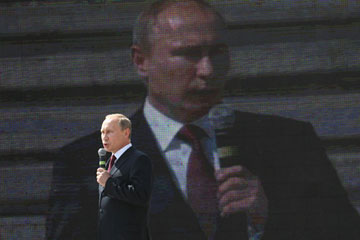
Russian President Vladimir Putin delivers a speech at the opening of the Barmaley Fountain on August 23, 2013 in Volgograd, Russia.
(4 of 7)
Such generosity is underwritten by the windfall of high oil prices, which have been at historic peaks under Putin, just as Russia became the largest producer of both crude oil and natural gas in the world, surpassing even Saudi Arabia. In 2006 energy exports let Russia pay off nearly all its remaining Soviet-era debt to the West--about $23.7 billion--years ahead of schedule. The money could have been used to raise wages or build badly needed infrastructure. "But Russia wanted to be in the club of countries that cannot be pressured from the outside, that can play its own game," says Natalia Orlova, chief economist at Alfa Bank in Moscow. "This was a political decision to free Russia from the pressure of Western creditors." Russia's public debt is now 10% of its GDP, compared with an average of 110% for other advanced economies, according to the World Bank.
But as Russia learned in 2008, a drop in the oil price would devastate its economy. The cost of crude collapsed that year from a peak of $145 per barrel to $30, and Russia's GDP contracted by 8%, the sharpest fall in a decade. That summer also put Russia's military to the test when a war broke out with neighboring Georgia--Stalin's homeland. Although Russia crushed its tiny adversary in less than a week, its war machine was shown to be an inefficient wreck. More tanks were lost to malfunction than enemy fire, and at one point Russian officers were forced to use store-bought navigation gadgets after the official ones gave out. "There were a lot of red faces in the general staff," recalls Sivkov, the military strategist.
The American Bogeyman
In a lookout tower high above the rally in Volgograd, the co-author of its script, Alexander Prokhanov, sat at a small table with a bottle of Soviet champagne. He stood up from time to time for a better view of the battle re-enactments on the stage, which combined the acrobatics of Cirque du Soleil with the aesthetics of The Hunt for Red October. "It is a joy to watch," Prokhanov told me in his balcony after the last barrage of fireworks. "What we're seeing now, what we saw tonight, is the process of resurrection, like a mammoth frozen in the Arctic waters that has begun to rise on its sturdy Russian legs."
Prokhanov, a right-wing demagogue no less prominent in Russia than Rush Limbaugh is in the U.S., sought to capture that sense of revivalism in the book he published last year, The Stride of Russian Victory. It argues that Moscow is destined to establish a new empire, the fifth in its history, based on Putin's vision of a "Eurasian Union" of former Soviet states. Making way for this empire will be the era of American decline, which Prokhanov, like much of Russia's political elite, judges to be imminent. In the opening chapter he writes, "Russia will shake off America's decrepit hegemony and take back the emptied geopolitical spaces ... Herein lies Russia's imperial chance, the rise of her imperial destiny."
